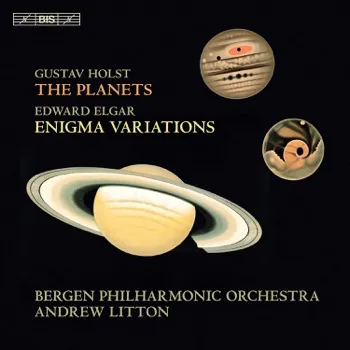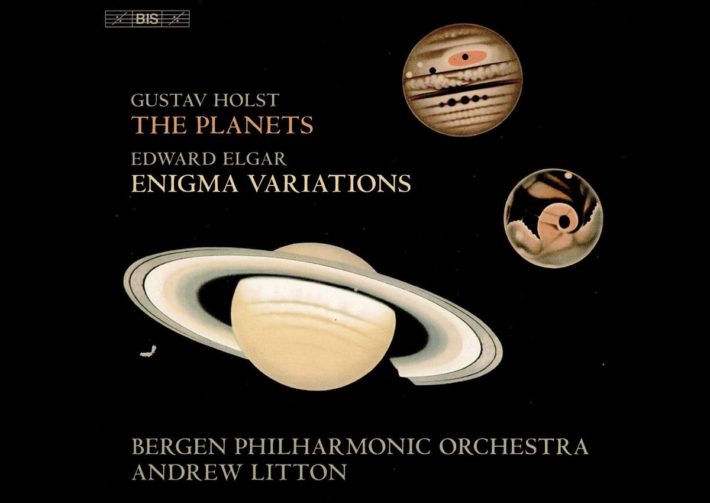Andrew Litton is no stranger to both works in this album, having been made a recording of Elgar’s Variations in the late 1980s, and of Holst’s “The Planets” in 1998 with the Royal Philharmonic Orchestra and the Dallas Symphony Orchestra, respectively. In this latest Holst recording, made in 2017, he conducts the Bergen Philharmonic Orchestra, another ensemble he has had a long relationship with, coupling it with Elgar’s “Enigma Variations”, recorded back in 2013.

Litton gives the theme of the “Enigma Variations” a sense of command and authority, bringing out different colors from the orchestra. The opening strings phrases have a solemnity, which ebbs away when the woodwind enter, bringing a shed of light and warmth. throughout the performance, Litton is attentive to all of Elgar’s markings, which brings integrity to each variation and its own strong character.
The first variation (”C.A.E.”), in which Elgar depicts his wife Alice, Litton voices the orchestral lines judiciously to allow the full beauty of the composer’s orchestration to be appreciated. Variation 7 (“Troyte”), although not marked as such, has the character of a scherzo. Litton maintains the rumbustious atmosphere but taking it a little slower than many interpretations. The famous “Nimrod” variation, despite its breadth, has a dignified air that never feels overly slow or sentimental. And in the final variation (“E.D.U.”), which is Elgar’s depiction of himself, Litton gives a charismatic rendition. In the closing bars, Elgar’s instructed ‘ritardando’ is fully applied, elongating the ending and creating a sense of grandeur and majesty. A small disappointment here is that the organ is overwhelmed by the orchestral sound.
Compared to Litton’s 1987 recording (currently available only on streaming services), he is more specious here, with climaxes built to a much higher intensity, sometimes at the expense of sounding over-planned. The earlier version was swifter and more spontaneous-sounding, yet scarified some final finesse the current recording has in abundant – The “Nimrod” variation is a good example.
Spacing Out
In Litton’s 1998 account of Holst’s “The Planets”, “Mars” was quicker and more dramatic, with a climax that peaks with a sense of annihilation. In the new recording, Litton is more restrained and 18 seconds slower. His Bergen recording maintains a dark atmosphere, but with a lesser intensity. As this movement unfolds, there is a measured approach that builds tension effectively, and so It’s only at the reprise of the opening (4:21) that the full might of Mars makes his presence felt. Again, the organ in Bergen is not as prominent as it could be; with the Dallas recording, the organ added additional depth to the rich orchestral palette.
Litton paints a voluptuous “Venus” with a seductive and sultry character. There is something absolutely captivating about his depiction of ‘the bringer of peace’, which is coincidentally the same length as in his Dallas version. Taking a broader tempo in “Mercury”, the movement is less skittish but also less convincing as the ‘winged messenger’.
“Jupiter”, is less boisterous than in the previous recording, but still energetic. The chorale section of the hymn tune ‘I Vow To Thee My Country’ is restrained but dignified. “Saturn” has a funereal solemnity, with the change in atmosphere at 5:59 sound truly magical, even profound. Throughout “Uranus”, Litton maintains a sinister and dark aura. Going back again to the 1998 version, the ethereal nature of “Neptune” was created with a greater sense of mystery where, towards the end, the female chorus blended more sympathetically. The combined female voices of the Bergen Philharmonic Choir and Edvard Grieg Kor have individual voices protruding out, which sadly become distracting.
The sound of the Bergen Philharmonic, recorded in SACD technique but can be played on both an SACD or a regular CD player, is captured exceptionally with a level of purity. The strings have a clean tone, woodwind a clarity, brass and percussion are balanced appropriately. The acoustics of Grieghallen, Bergen create a reverberance in the slower, quieter moments, but in the quicker, louder passages it blemishes the textures, as in variation 4 of the “Enigma Variations”. This is less problematic in the Holst, in which the acoustic is less noticeable.
The performances of both works are not instantly charming, but the rewards come through repeated listening. Each work evolves into something distinctive and obviously considered. Litton’s approach to Elgar highlights the contrasting musical personalities contained within each of the variations, but he lacks the uniformity of approach which can be found in Sir Adrian Boult’s 1970 London Symphony Orchestra recording. Litton’s phrasing is not as instinctively Elgarian as Boult, who’s understanding of the rise and fall of the composer’s marking is much more intrinsic.
In “The Planets”, Litton’s is more introverted, which takes longer to fully appreciate. Litton’s Dallas and Sir Andrew Davis’ rendition of 1994 with the BBC Symphony Orchestra are ones which are easier to engage with initially.
Elgar – Enigma Variations
Holst – The Planets
Bergen Philharmonic Orchestra
Andrew Litton – Conductor
BIS Records, Hybrid SACD BIS-2068




















